Expert Guide to Security for Caravans, Motorhomes and Trailers
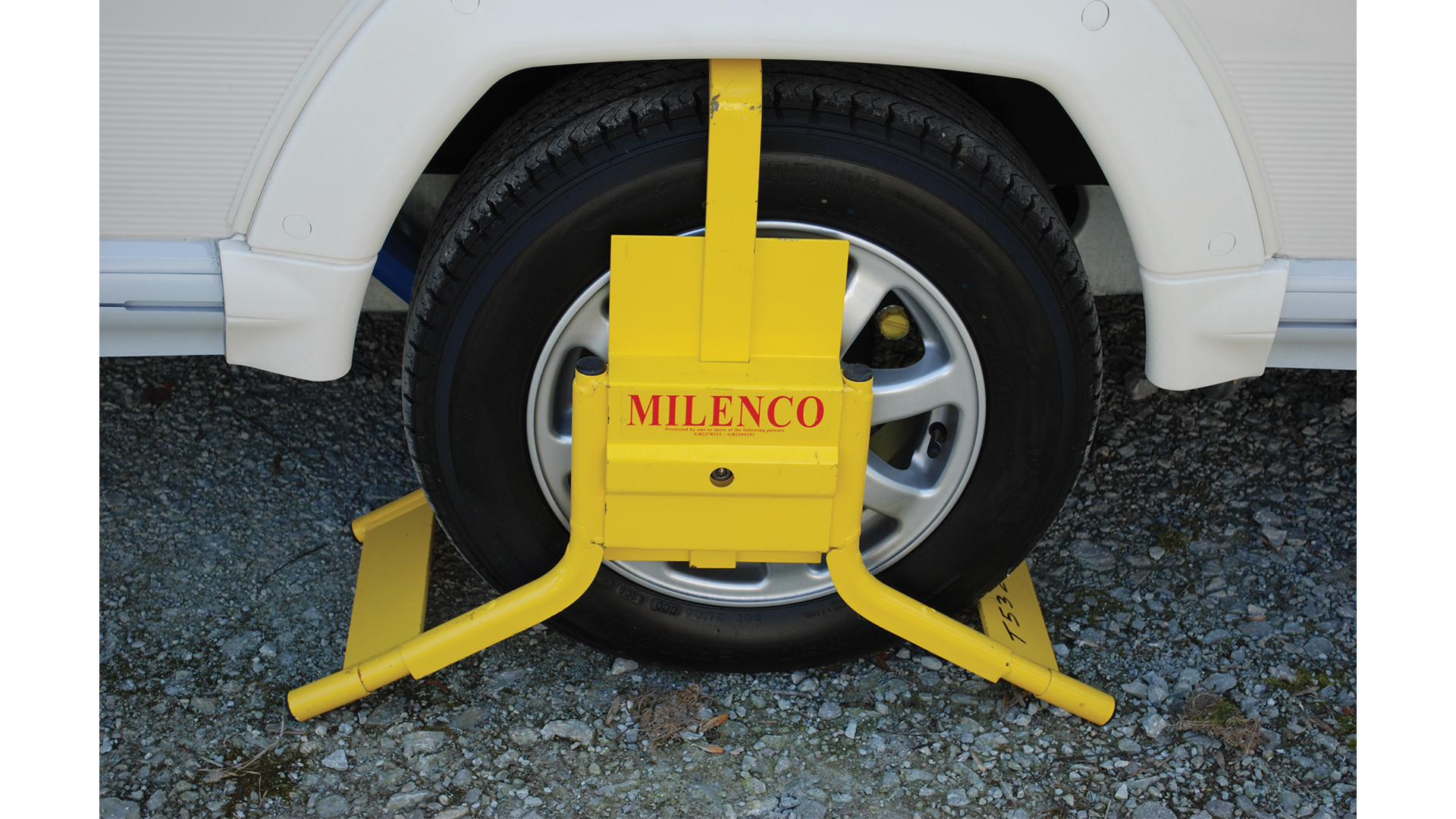
Most of us accept the need to maintain our caravan or motorhome to obtain the maximum benefit from it but sometimes security is neglected as being non-essential, until it's too late. There is always a risk of theft and thieves will see an opportunity whether your caravan, motorhome or trailer is worth £25,000 or £1,000. Much of the following advice is directed at caravans but some is applicable to trailers and motorhomes, with mention of some products applicable to particular units.
Basic Advice
- Deter the opportunist thief by using relatively inexpensive products
- Consider the best security devices available to reduce the risks of your unit being stolen and also reduce your insurance premiums
- Consider means to help recovery of your unit if it is stolen
- Deter thefts of property from your unit with simple devices
- Thieves don't only steal when your unit is stored, it's vulnerable at all times even when just stopping for a cup of tea or to stretch your legs at a motorway service station. You therefore need to consider a range of measures to protect yourself at all times
Products to deter the thief
There are hundreds of caravan security devices on the market, with some being better than others. As with most things you generally get what you pay for, but independent testing is often the best way to check the capability of security equipment.
Mechanical security is designed to keep your kit where you left it. Referring to the following organisations and their standards can help guide you in selecting the right product.
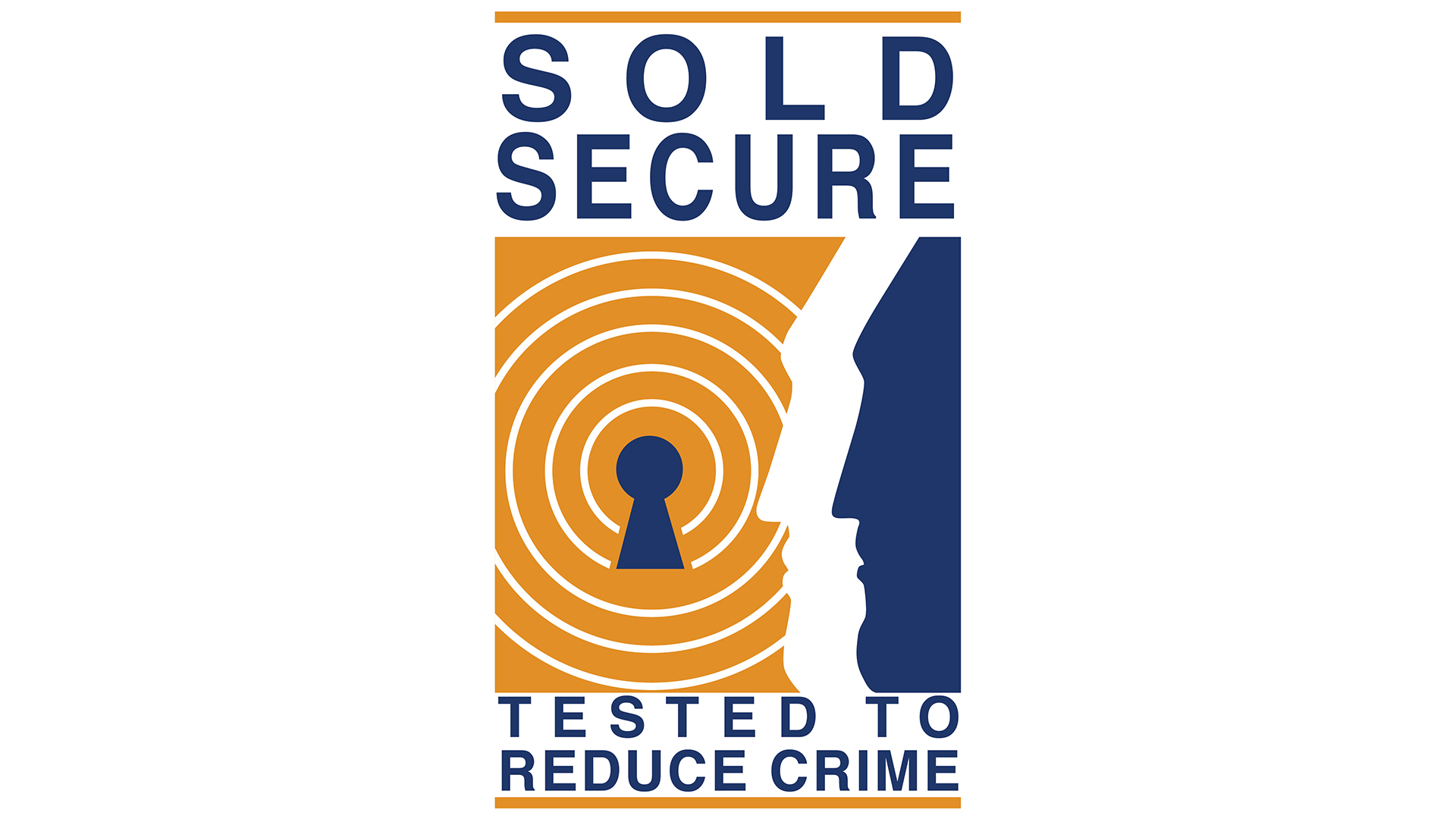
Sold Secure is administered by the Master Locksmiths Association. They have been testing and providing professional and factual advice regarding security products since 1992. Sold Secure 'attack tests' test potential products in controlled conditions and then provides certification at one of four levels, these vary depending on the type of attack, tools used, and time the test lasts for.
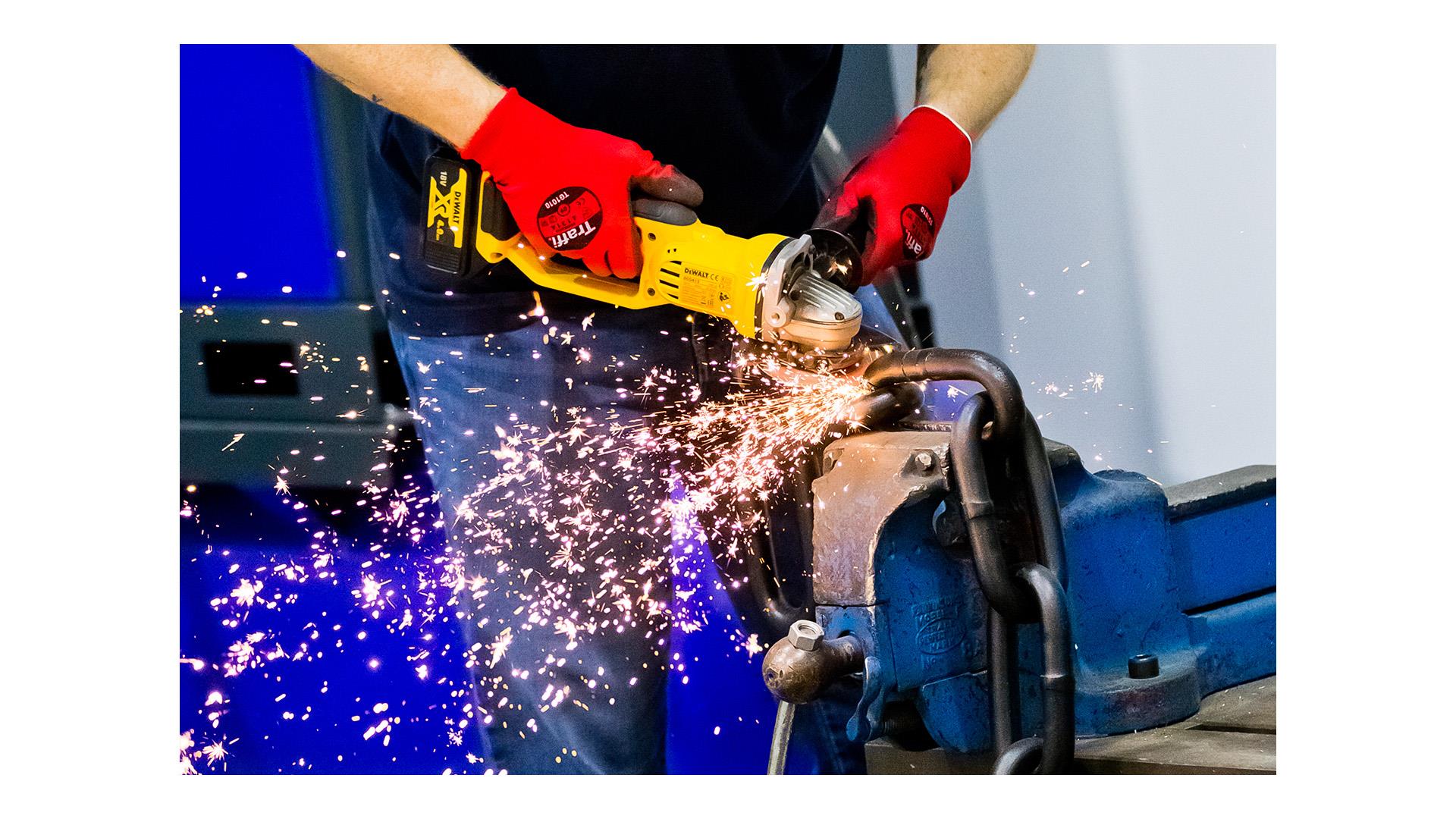
Sold Secure technicians carry out a variety of attack tests to set the level of security certification
Bronze
Offering theft resistance against a basic tool list (aimed at preventing opportunist crime)
Silver
Offering theft resistance against an enhanced tool list (aimed at preventing a more determined attack)
Gold
Offering theft resistance against a dedicated tool list (aimed at preventing dedicated attacks)
Diamond
The highest level of theft resistance including use of specialist tools (aimed at preventing the most destructive attacks that could include the use of angle grinders)
Sold Secure maintains lists of current approved products and which level applies https://www.soldsecure.com/about-us. The Club only recommends Sold Secure approved products for mechanical locks.
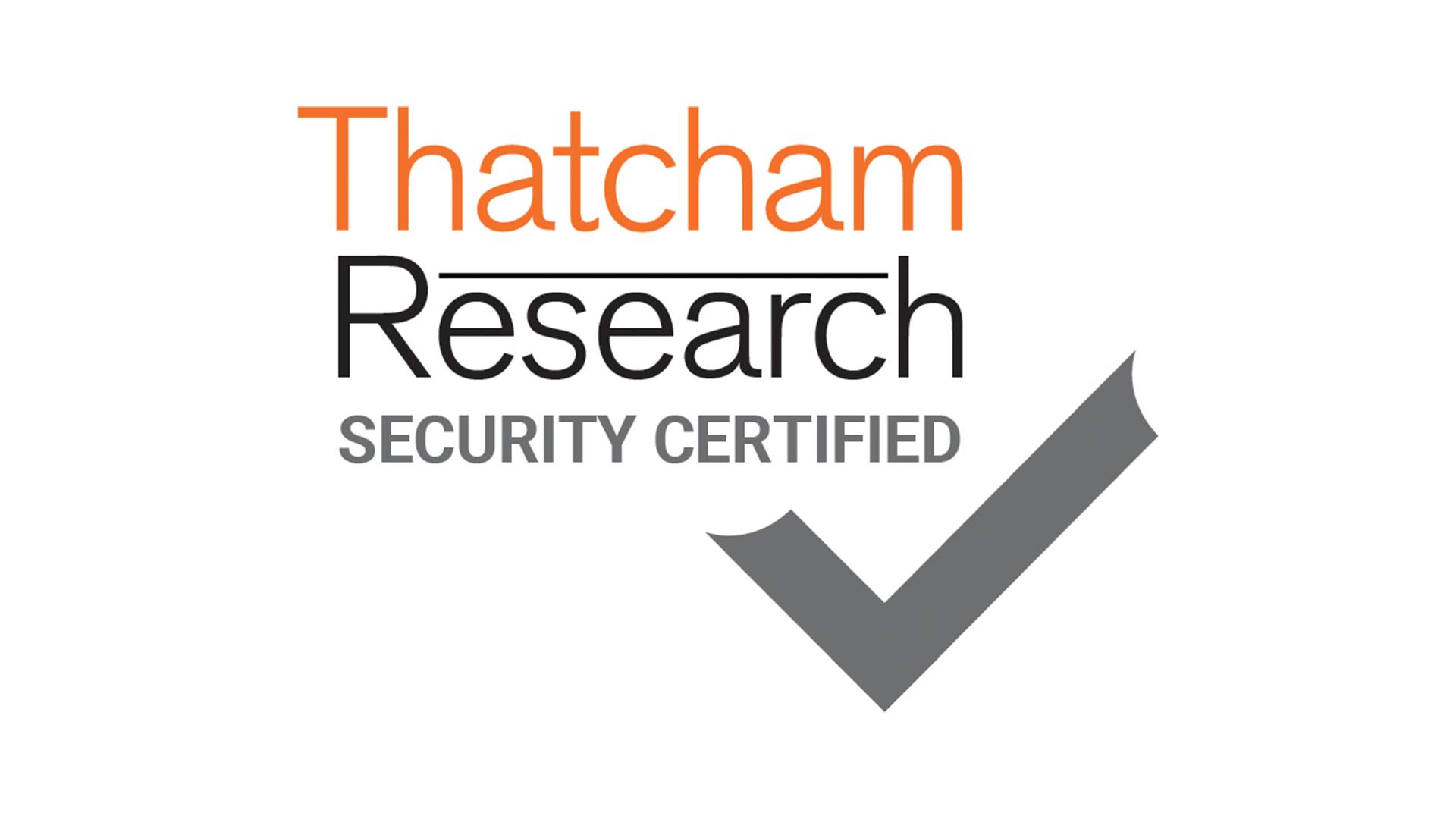
Thatcham Certification Electronic security can take a few different forms. Alarms are the most common type and most motorised vehicles can have a factory-fitted immobiliser and/or alarm. Good quality alarms, immobilisers, and trackers are approved by Thatcham www.thatcham.org. This is the insurance industry research body and it has been looking after vehicle security since the 1990s. The grading of Thatcham approvals is as follows – elements can be combined or stand alone:
Category 1 – Combined electronic immobiliser and alarm
Prevent or curtail unauthorised use and access
Category 2 – Immobiliser
Prevent or curtail unauthorised use
Category 2/1 – Alarm upgrade
Prevent or curtail unauthorised access
Category S5 – Vehicle tracking system
Detect unauthorised movement and increase the probability of recovery of a stolen asset. Includes 24/7 monitoring by contact centre. Uses GPS
Category S7 – Asset location system
Increase the probability of recovery of a stolen asset. Includes 24/7 monitoring by contact centre. Can be precisely located.
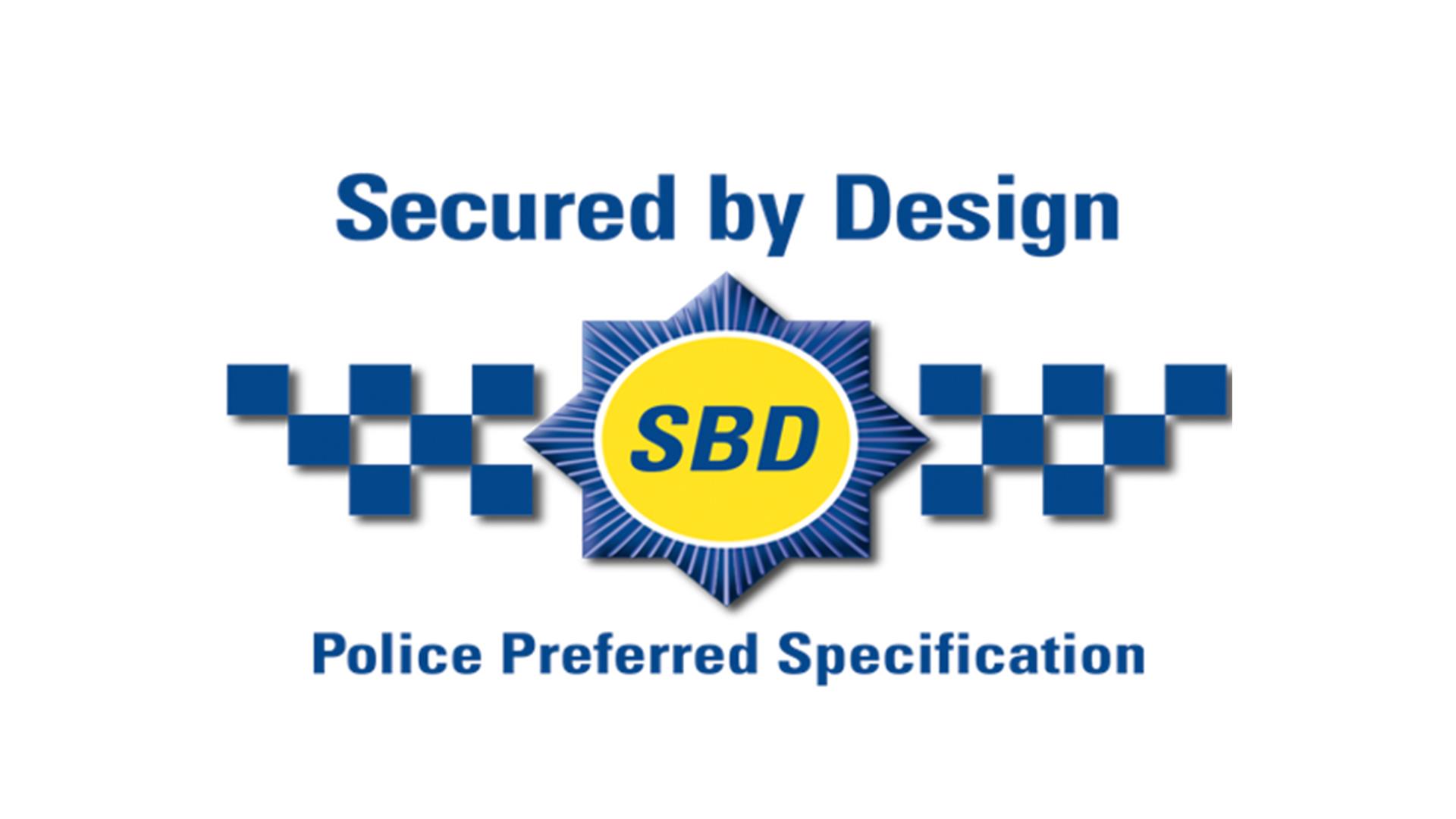
Secured by Design (SBD) operates an accreditation scheme on behalf of the UK Police for products or services that have met recognised security standards such as being tested and certified by an approved body including Sold Secure and Thatcham, or independently tested to a relevant security standard and be certified by an independent third-party. The scheme also requires regular re-testing and an annual inspection of the manufacturing facility to ensure quality and performance are maintained.
It is important to understand that no product can guarantee a unit will not be stolen. The aim is to deter a thief who prefers easier pickings or to slow down the more determined thief, or the one with a good toolbox containing large lever bars and disc cutters.
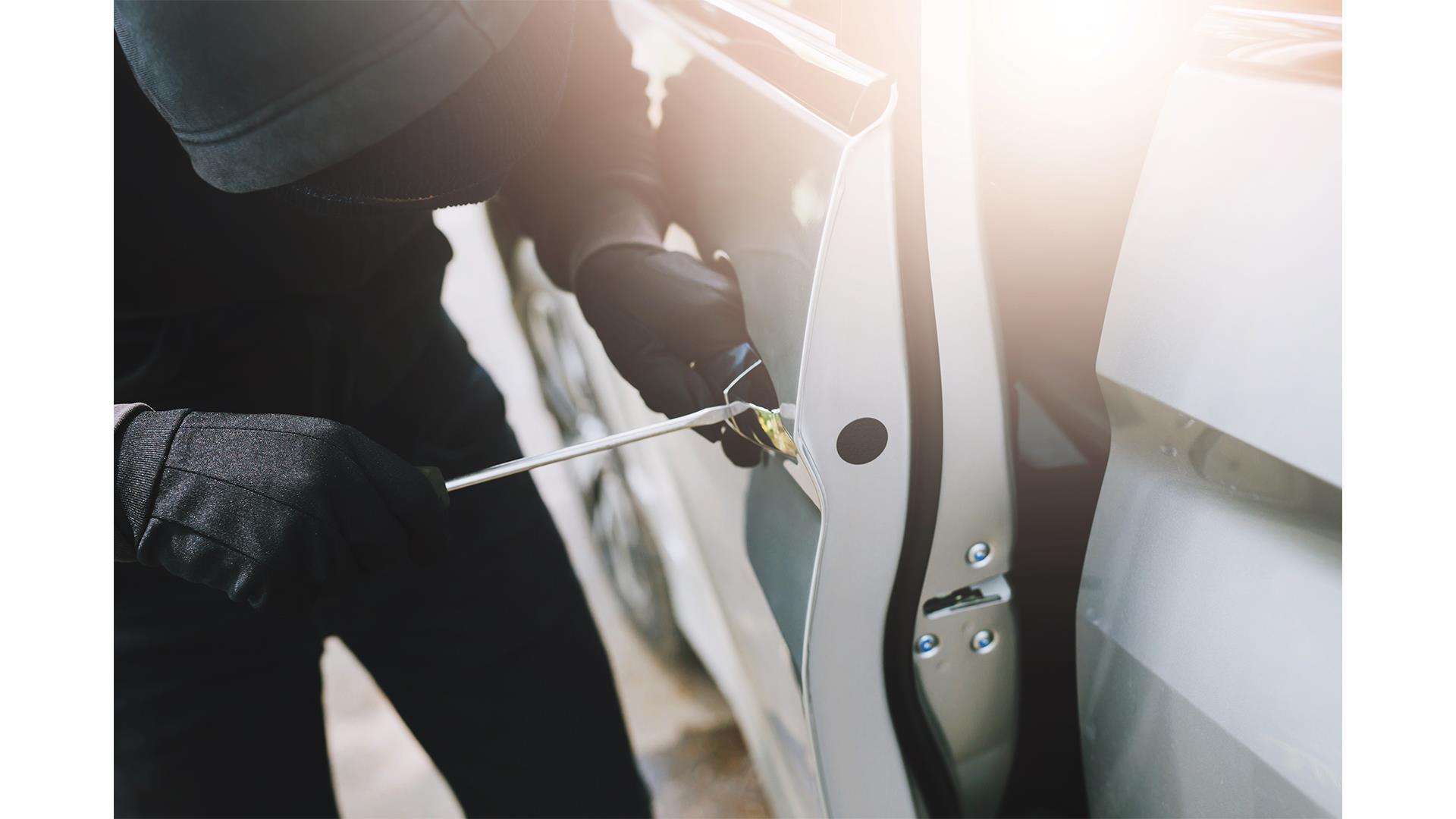
There are tools that can help the thief, protect your kit with good security
Fitting more than one security measure should slow down a thief more than simply using one. When looking at mechanical security devices remember there are at least two things to consider: the strength of the material it is made of; and the lock. A wheel clamp made of thick high-grade steel is worthless if secured by a cheap lock that can be defeated in a minute.
You will also need to consider the requirements of your insurance company. Often policies will require a minimum of a hitchlock and wheel clamp to be fitted to a caravan for standard cover, but will give discounts if higher grade measures like an approved wheel lock or tracker device is fitted.
Don't forget to make sure the thief knows the device is fitted so brightly coloured devices or stickers in the window help, though some tracker devices depend on being hidden and unknown to the thief.
Available products
Hitch locks
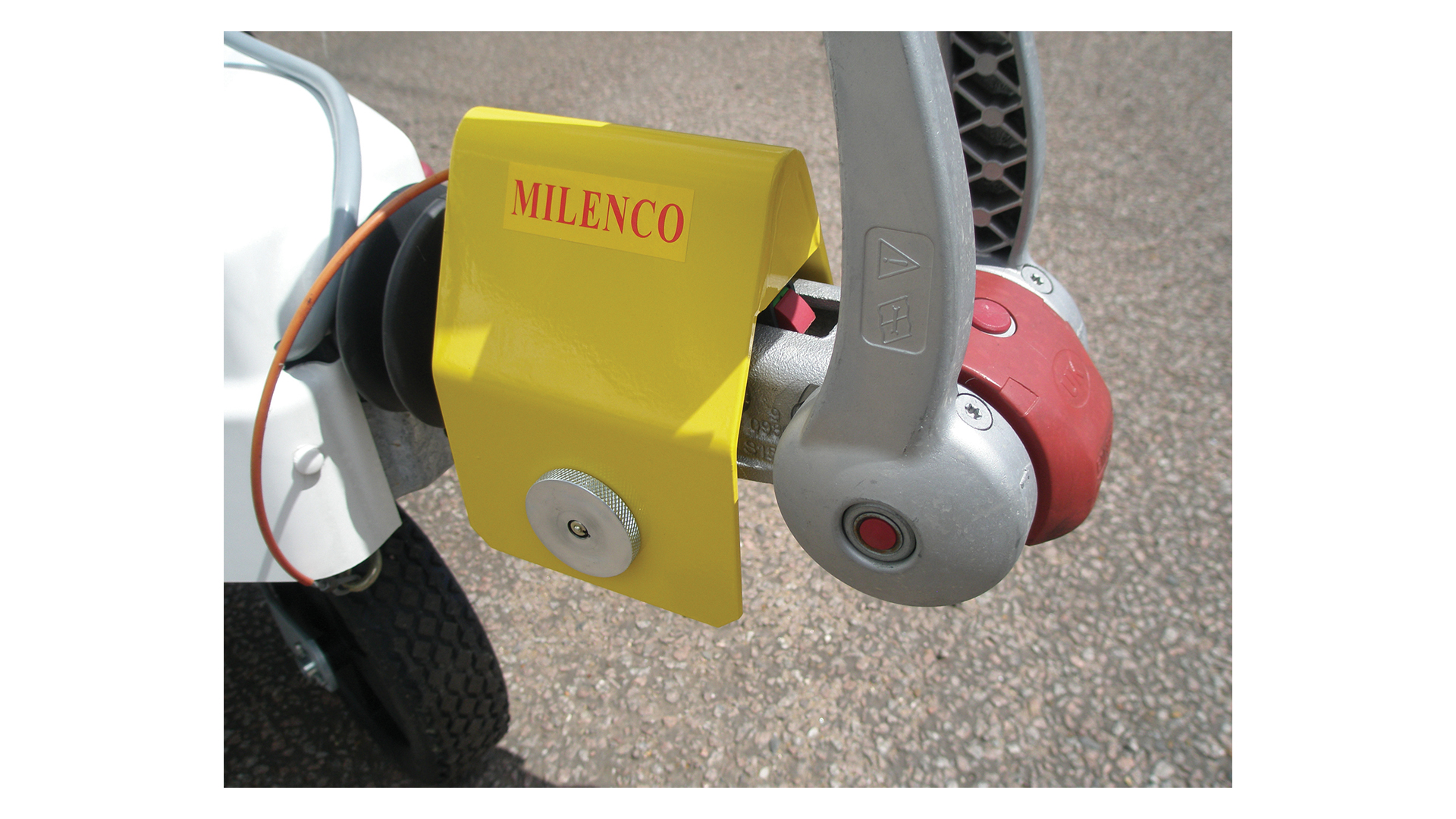
A hitch lock such as this will provide some protection against theft
A good hitch lock will provide a reasonable degree of protection from the opportunist thief, but it will not provide sufficient security on its own as the determined thief can bypass the device. Buy one that is manufactured from heavy steel and covers the hitch fixing bolts. Some hitch locks can lock the caravan to the car towball and this is useful when stopping at a service station en route to a campsite. Even if designed to do so we do not recommend leaving the hitch lock fitted while in transit, it may hinder the Emergency Services.
Wheel clamps
Wheel clamps come in all sorts of qualities, but a good product will help deter thieves as it takes time to remove. It should always be used whenever the caravan is left unattended, at home or away.
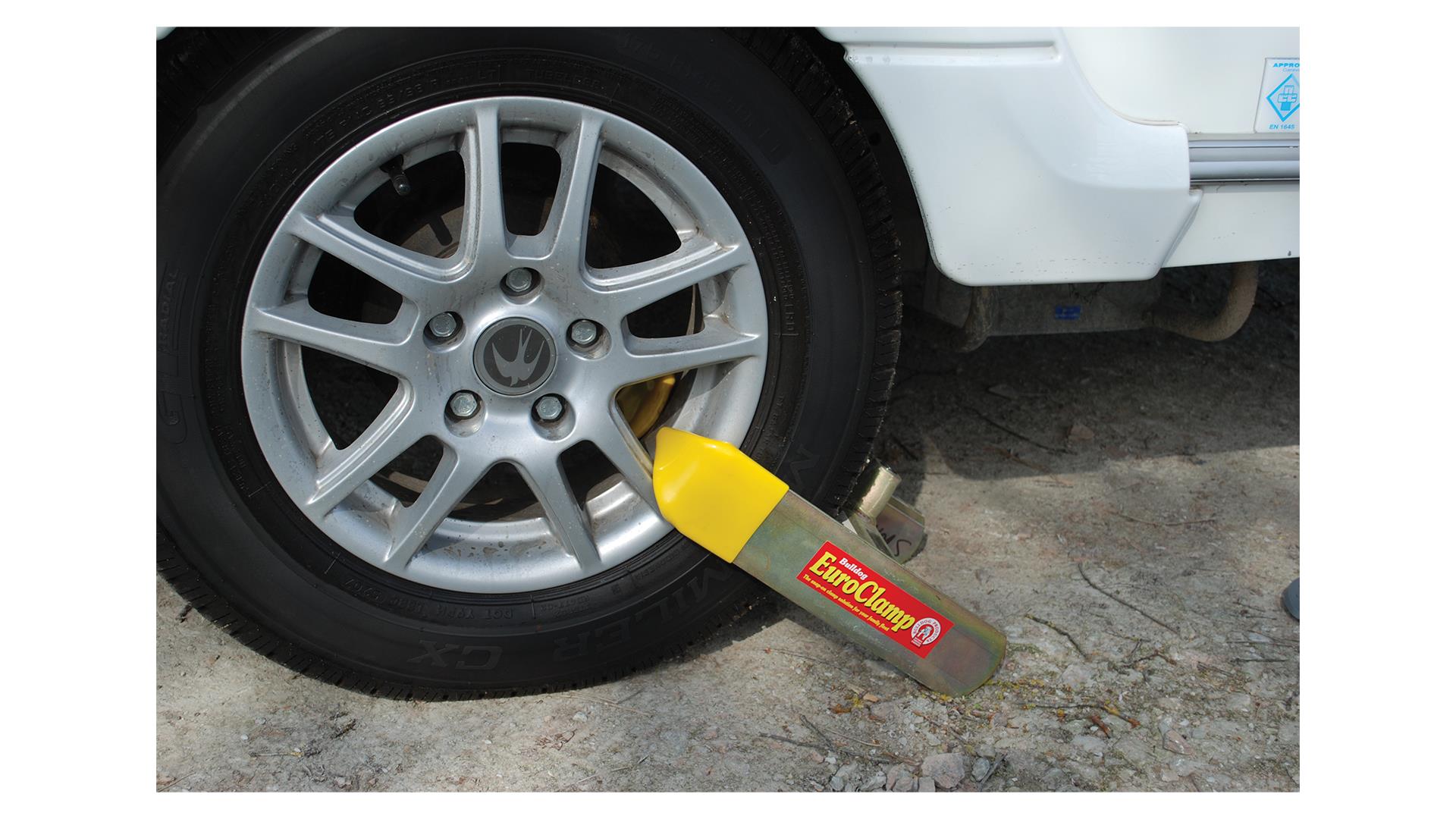
Remember, if the product is heavy, bulky and difficult to fit, you are less likely to use it and however effective it is, it's useless unless it's fitted. For example, take a couple of Milenco products, both Gold Sold Secure gold rated wheel clamps. The Original wheel clamp is ideal for taking away at a relatively lightweight 12.3kg, while its big brother the Mega Clamp is far heavier at 27.5kg and boasts concrete-filled arms that will resist most forms of attack disc cutters and oxyacetylene burning.
The Mega Clamp should provide better protection and could be a good choice for when the caravan is left in storage but may be too large to take away on holiday. Remember to read the manufacturer's instructions and comply with them. Also, some clamps leave the unit's wheel nuts exposed meaning the clamp can be removed by removing the wheel. In this case, you may like to consider using locking wheel nuts alongside the clamp.
Wheel locks
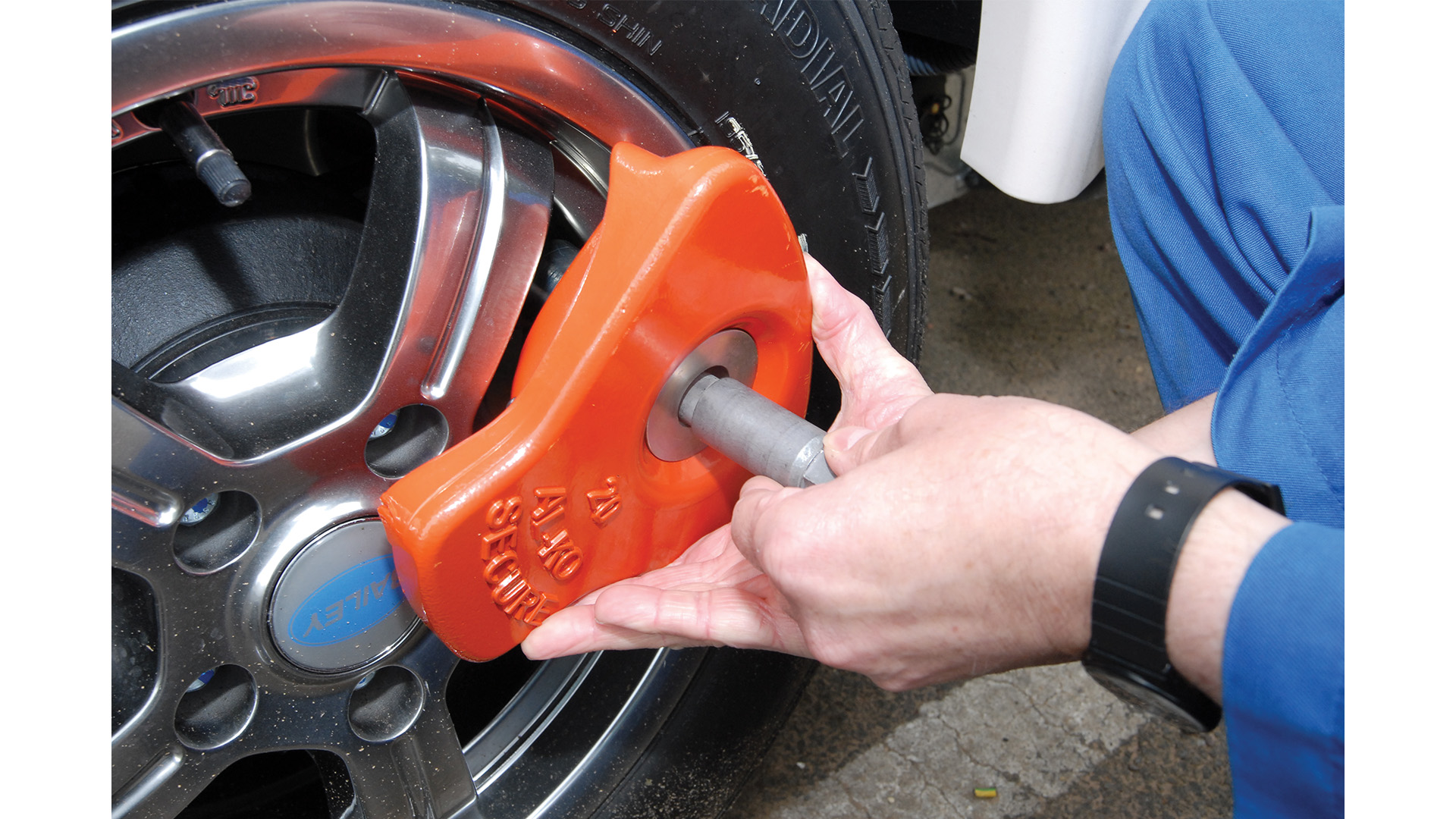
An Al-Ko Secure wheel lock has to be matched to your wheel design to provide a perfect fit
AL-Ko make a security device that fits through the caravan's wheel to an axle-mounted receiver. These are made to Sold Secure's Diamond standard, unique to wheel locks, and are recognised as an effective security lock for caravans. The use of these Diamond standard wheel locks will usually produce a significant reduction in your insurance premium. But note the AL-KO wheel locks are specific to the cast of the alloy wheels and a new lock may be needed when you change your caravan.
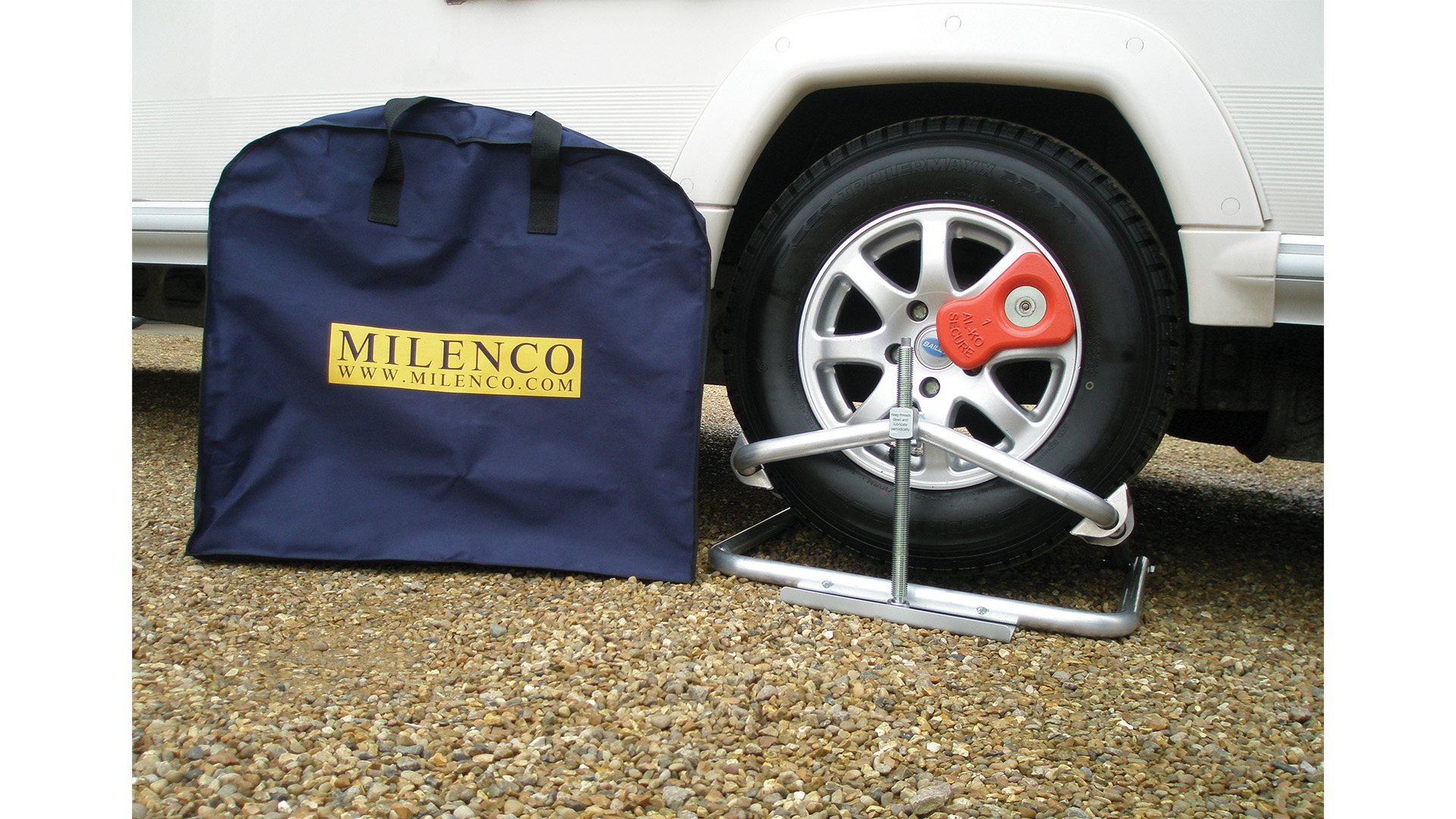
There is a disadvantage to these locks in that you have to align the wheel and the receiver perfectly to fit them. This is not usually a problem in storage, but on site when you have achieved your perfect level on the ramp, how do you then align the wheel aperture with the hub? One solution is to use a wheel leveller rather than ramp. It can also be challenging to fit the locks to both wheels on a twin-axle caravan. You are likely to need a jack to position the second receiver although a product called LockNLevel may provide a solution.
Security posts
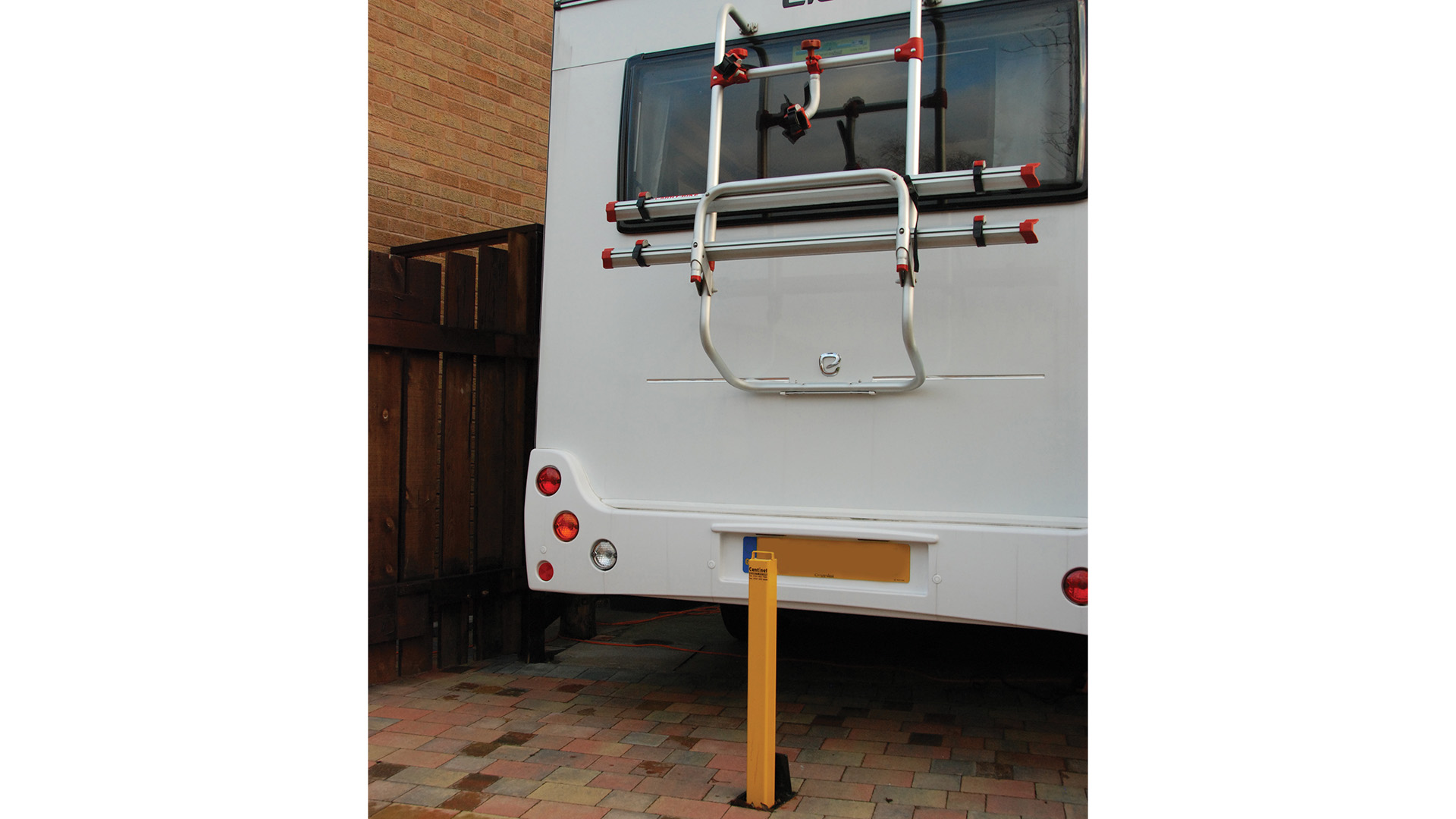
These can be useful, especially if you keep your caravan at home. For greatest security the posts need to be set in concrete and have an internal locking mechanism to avoid the vulnerability of a padlock. Posts can be purchased with a towball on top so the caravan hitch can be locked on making them highly effective as both the hitch lock and post need to be physically overcome to allow the removal of the unit.
Wheel stands/winter wheels
If you think that taking the wheels off your caravan when it's in storage will provide protection to the tyres and prevent theft think again. Thieves may view the caravan on axle stands as an opportunity for fitting replacement wheels. It could also invalidate your insurance if your provider insists on a wheel clamp or lock being fitted. There are lockable winter wheels available and even a Sold Secure Gold standard product, but do check with your insurance company before fitting them.
Miscellaneous locks
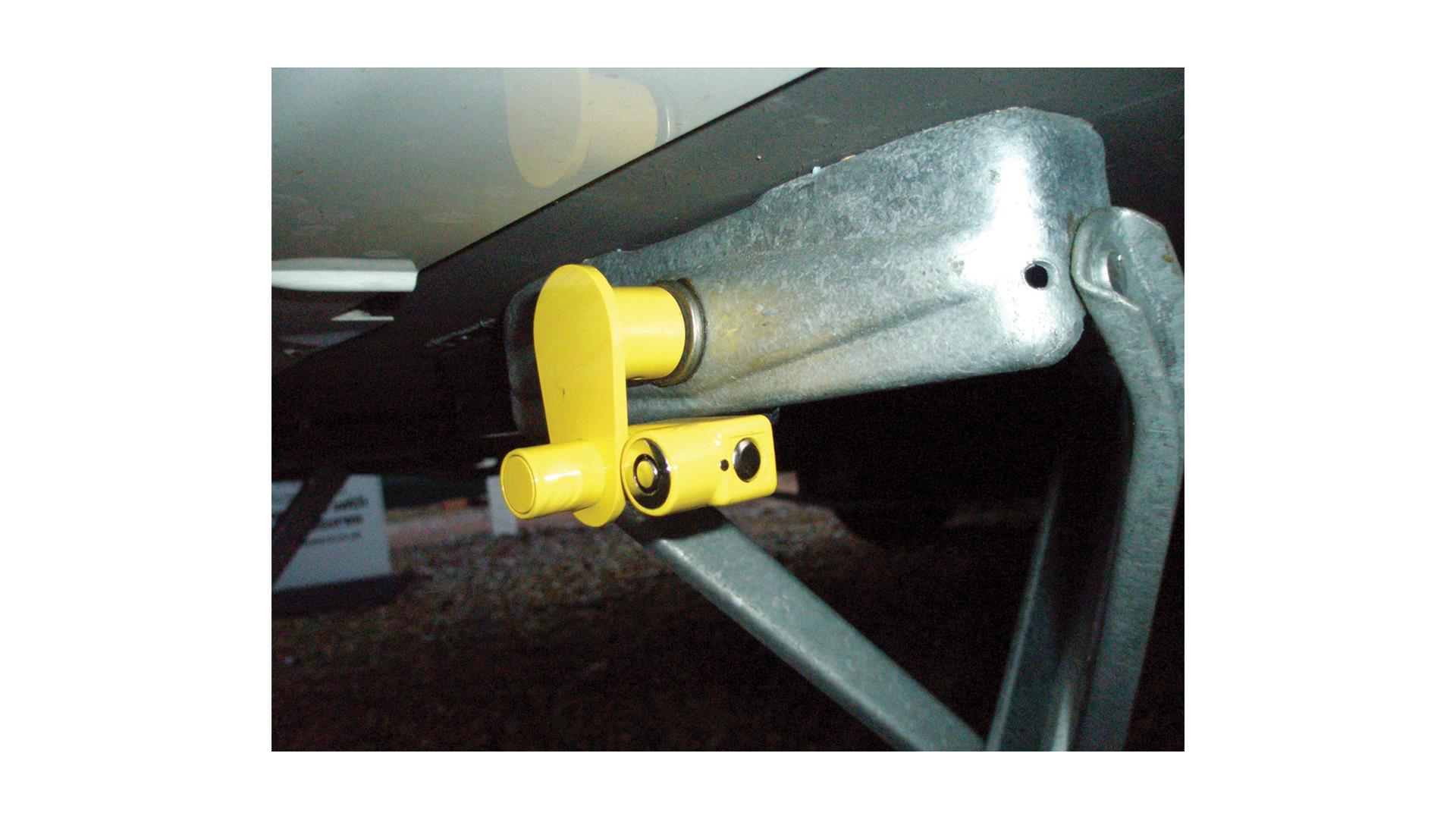
Corner steady locks are a simple, compact device that enable the corner steady legs to be locked in the down position. These are lightweight, relatively cheap and easy-to-fit devices, and can improve an existing good basic security system.
Motorhomes and campervans
Although a motorised vehicle will already have a good amount of inbuilt electronic and mechanical security it is worth bolstering this with additional layers to make the thief think twice about stealing your pride and joy.
A steering wheel lock that can prevent the rotation of the steering wheel is a good starting point and also makes a very visible deterrent. An example is Milenco's high security steering wheel lock. It is longer than its car counterpart for the more open cab area in a motorhome or campervan.
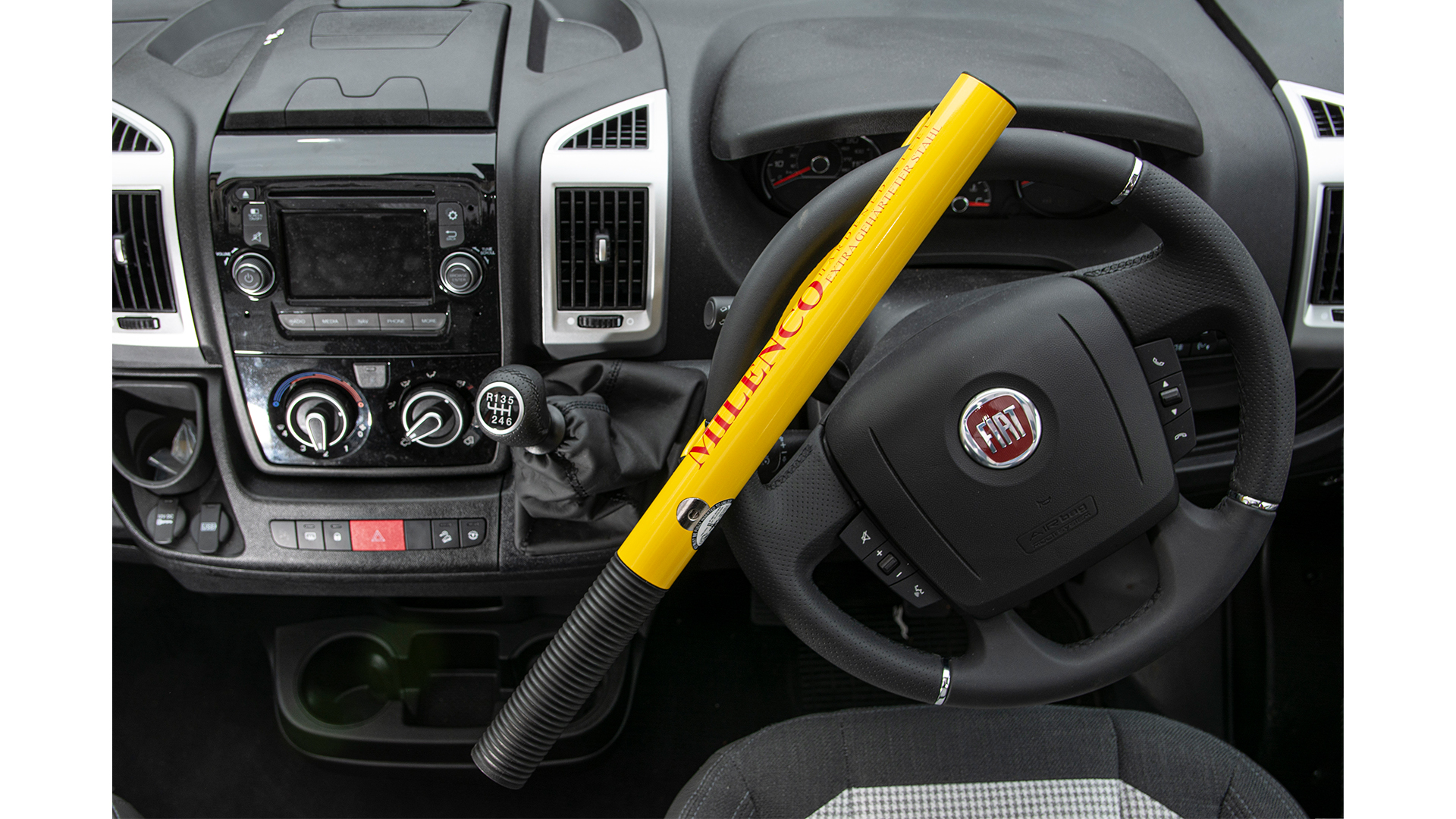
There are devices such as a Clutch Claw and other types that cover and inhibit the use of the driving pedals that are a relatively simple way to deter or slow down a thief.
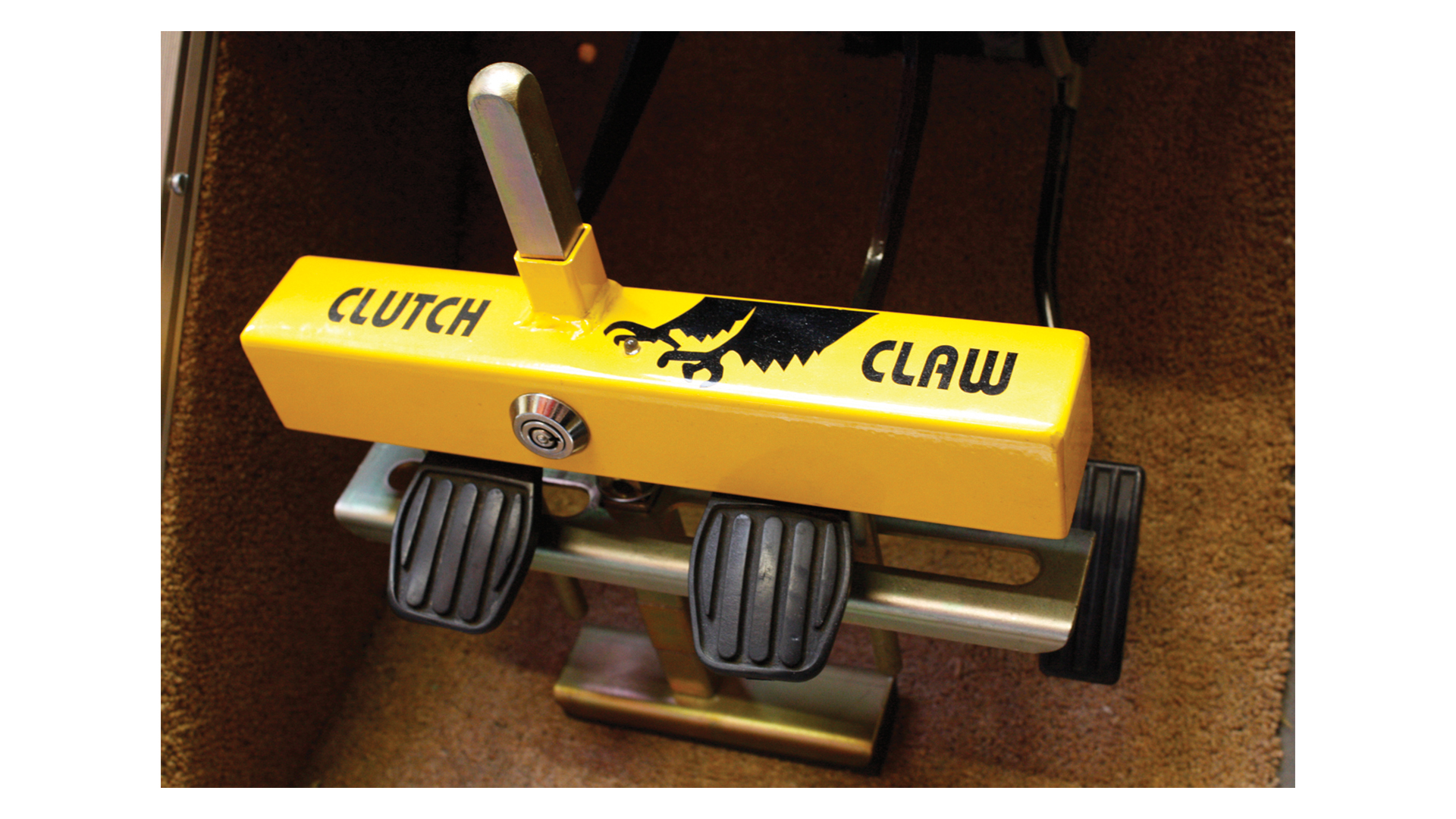
Depending on the size of the road wheels standard wheel clamps may fit, however, there are products like the SAS Defender designed for campervans and motorhomes that make a very visible deterrent and are Sold Secure approved, just don't forget its fitted!
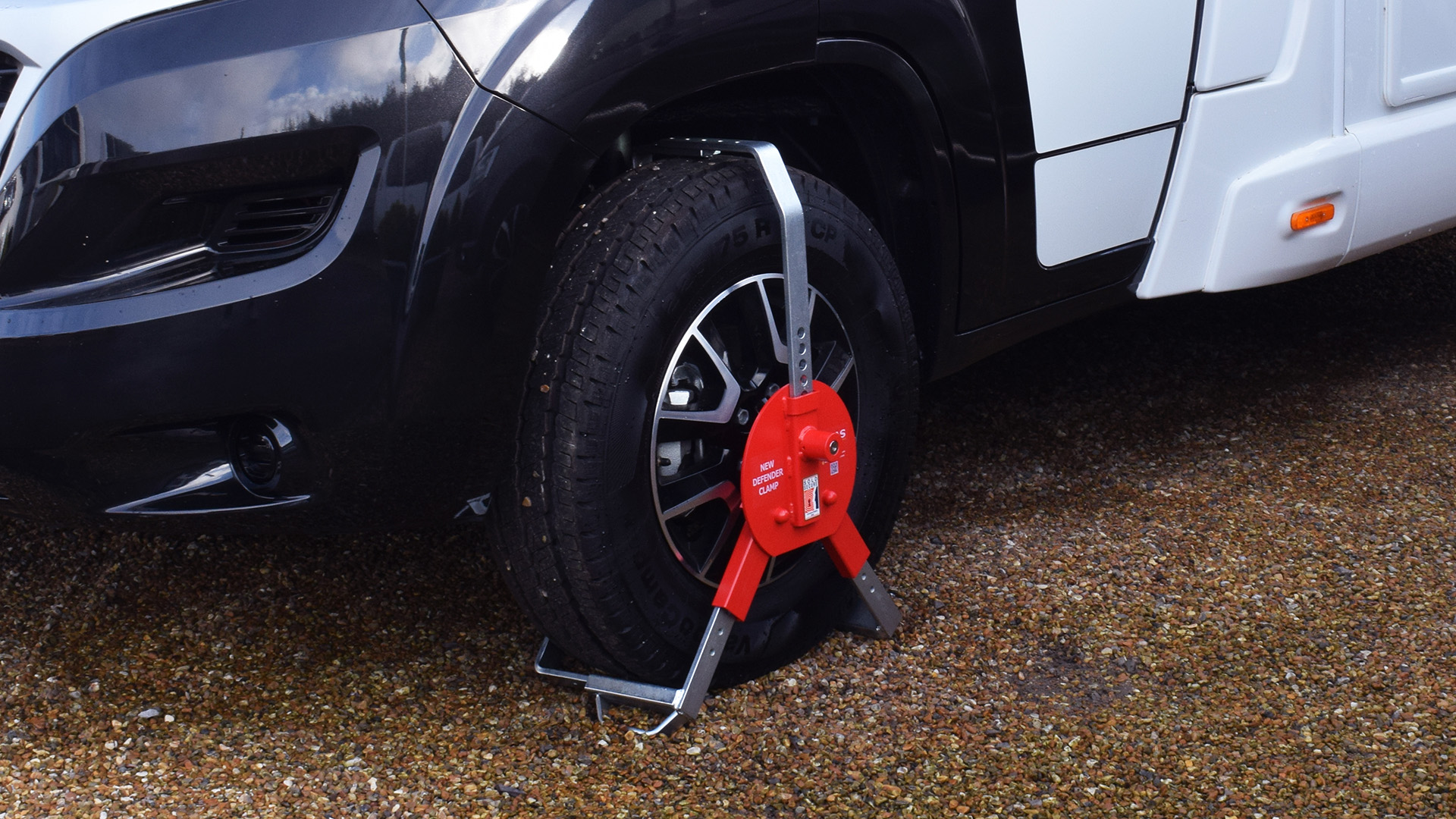
Alarms
A reliable alarm, used alongside other security devices, can deter thieves. It can provide warning if someone attempts to move your caravan or gain entry. Whatever the type and purpose of the alarm, make sure that it is reliable and properly fitted. An alarm that goes off regularly when no thieves are near will make you unpopular with neighbours and cause the alarm to be ignored when there is a genuine incident. Consider what features are provided with the alarm such as internal motion sensors to detect intruders or other sensors that can detect the rotation of a steady leg winder or movement of the unit. If you keep your caravan at home, it is sometimes possible to connect your caravan system into your home alarm system, if you have one fitted. Similarly, if you have a tracker device fitted, it is often possible to link an intruder detector to the same control centre. Talk to the people who fitted your house alarm or tracker unit. One of the simplest alarms is the standard personal alarm that uses a pull cord action. These can be used to protect doors at night and can even be used to protect tents, attached between a ground peg and tent zip. Ideally the alarm should be Thatcham approved to get a reasonable insurance discount and give the confidence it will help deter the thief.
Immobilisers are devices that interfere with the motorhome or campervan systems to prevent it being driven. They require a specific coded key inserted into the vehicle to disable them. They do not prevent the vehicle being broken into or being towed away.
Keyless car theft is where the criminal pulls the remote unlock signal from your keyfob. If you have a keyfob where you don’t need to press a button to unlock your car, then the vehicle is at risk. Placing the keys in a Faraday pouch can prevent this, these are available at car accessories shops.
Getting your unit back
If your unit is stolen the chances of getting it back can be dramatically improved by taking the following measures first:
Taking photographs
Photograph your outfit, taking particular note of any distinctive features that could identify the unit and help the police.
Etching and marking
If your caravan was manufactured in the UK since 1992 it should have a Central Registration & identification Scheme (CRiS) mark on the windows and chassis – a unique 17-character identification. Ensure you keep the CRiS or DVLA registration document for your caravan or motorhome in a safe place and not in your unit. Inside the caravan or motorhome you can use either an ultra-violet pen or a simple spirit-based felt tipped pen on raw plywood inside a cupboard or under beds with the CRiS ID or vehicle registration for a motorhome. If you have an imported caravan you can still have your unit CRiS registered. This is worth doing as the value of the CRiS system is recognised by the police when carrying out checks for stolen caravans. Microdot security packages are also available to mark up an outfit's fixtures and fittings and a system known as Smart Water can be also useful in a caravan's interior to provide a unique, traceable code.
Central Registration and Identification Scheme (CRiS)
Since 1992 all new caravans manufactured by members of the National Caravan Council (NCC) have been registered with the CRiS and will therefore have the caravan VIN marked on the caravan windows and the caravan chassis. From 1998 a RFID chip was added to uniquely identify the vehicle. Some insurers may require registration with this scheme, there is no legal requirement in the UK to do this with caravans, but we do highly recommend the scheme as it aids finding stolen vehicles.
Vin Chip
Since 2016 VIN Chip is the latest standard marking system on new NCC approved caravans and motorhomes. Tamper evident labels replaced the original dot matrix window markings used in CRiS marking and additional secure electronic RFID ‘chips’ were placed within the structure which, when scanned by law enforcement officers, will also read your caravan VIN. A ‘smart’ window label also allows for the caravan’s details to be ‘read’ using the QR code system. The CRiS system holds information about the current keeper, outstanding finance, theft records and reports where insurers have ‘written off’ a caravan. It is strongly recommended that, when considering buying a pre-owned caravan, you check with CRiS to ensure the person selling the caravan has the right to do so or register any non NCC approved products. www.cris.co.uk

Roof marking
Mark the roof of your van with the last six characters of its CRiS number with large stick-on letters that can be read by roadside cameras. Commercial stick-on kits are available or you can make your own.
Tracking systems
The most up-to-date systems use GPS satellite and mobile phone technology to send a signal out that can be used to locate the unit. There are two main types, passive ones and those that automatically send out an alarm when the unit is moved. The better systems will send the signal to a control centre, which will then contact the owner to check the movement is legitimate.
They should be a covert aid to the recovery of a vehicle. Ideally having a product independently installed and being self-contained rather than wired can help avoid detection of the device which is the key to a robust system. A 24/7 monitoring centre is required for Thatcham approval, consider how the company tracks down your asset and recovers it. Cheap trackers are unlikely to get a police response. Products supplied by AX Track are installed covertly by a vetted engineer to avoid detection and can be remotely accessed to aid detection by the AX Track recovery team.
![]()
These control centres, if Association of Chief Police Officers (ACPO) approved, will obtain a rapid response from the police. The systems do however require battery power and while the units have their own back-up battery, if the thieves disconnect the unit's battery, this only works for a relatively short period. You must therefore ensure your unit's battery is kept in good condition while in long-term storage. While these systems require a reasonable cash outlay and an annual fee, they produce good results and many insurance companies offer considerable discounts when a good quality tracking system is installed.
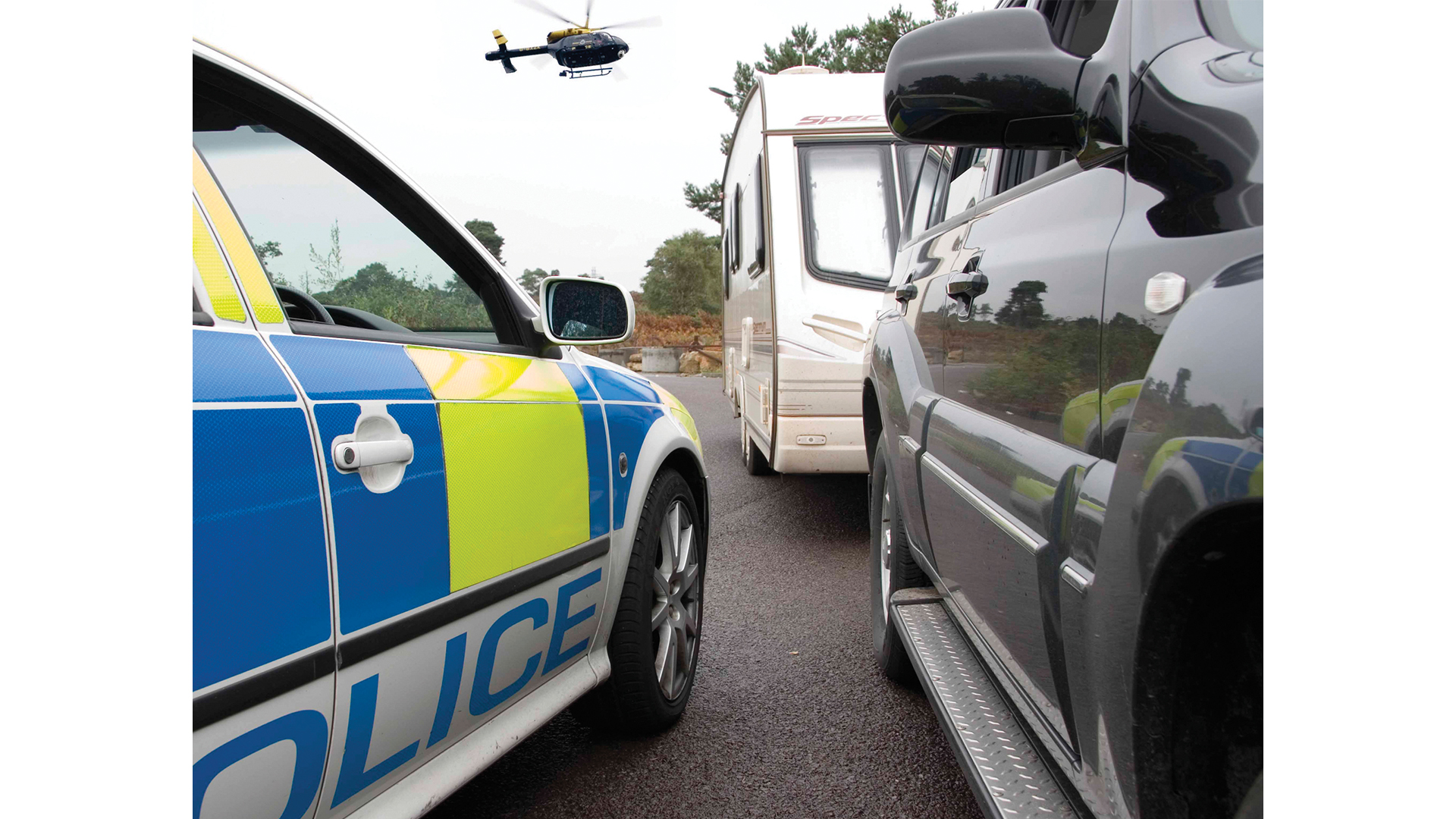
Deterring theft from your unit
Alarms
Sophisticated alarms to deter theft of the unit are often useful to warn of unauthorised entry into the unit. There are also inexpensive small individual alarms available for the doors and windows, although these are generally more suited for short-term use when camping.
Improved locks
Caravan and motorhome door locks are generally not robust security devices. You can buy kit to improve the security of your existing lock, such as the Brightlock, or your dealer can fit a more secure locking mechanism to your existing lock. Alternatively you can put additional locks on the door. If you fit extra locks, make sure you can still easily exit from the unit in an emergency.
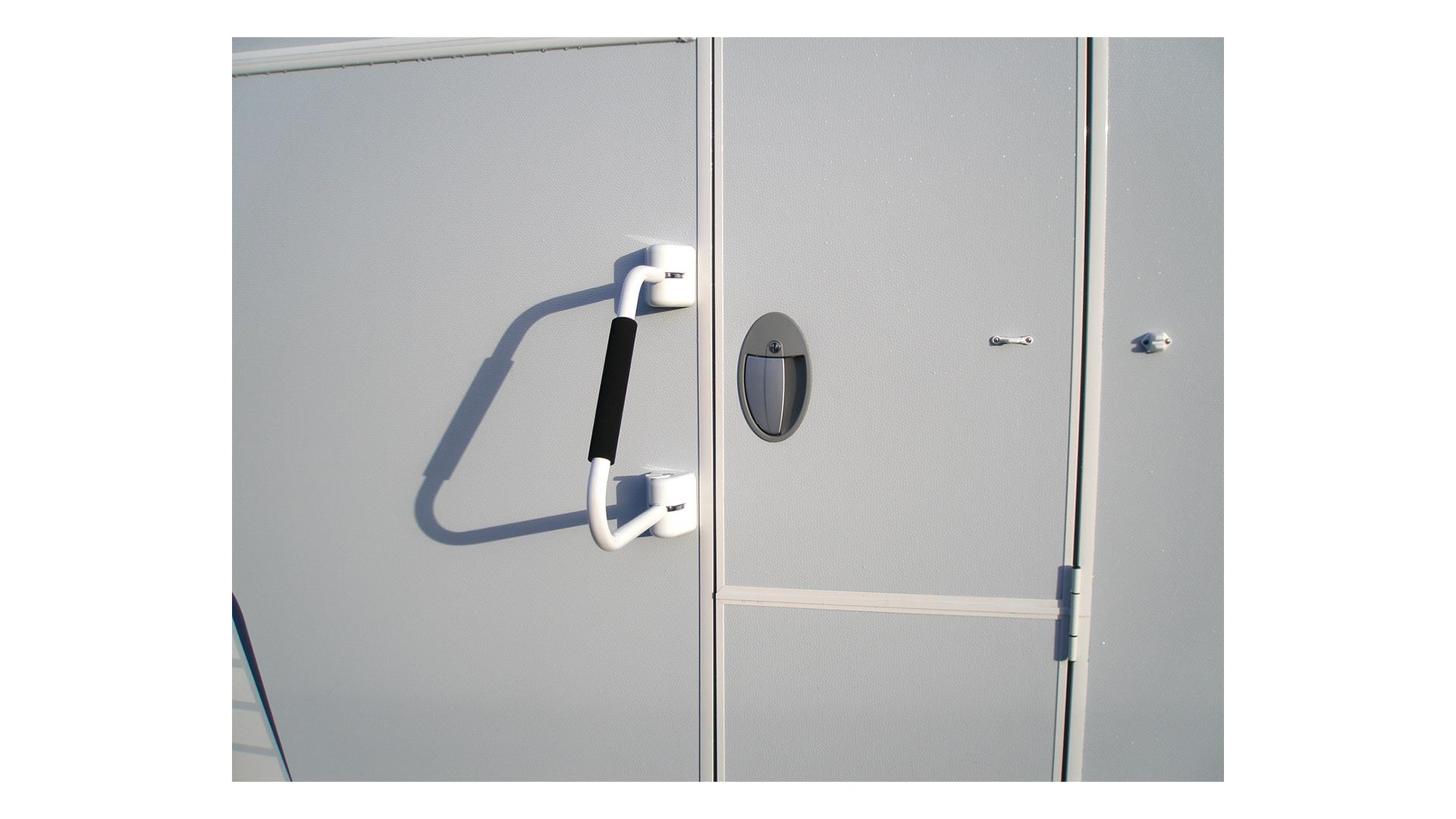
This Milenco Security Handrail can be locked closed across the door offering additional security
Covers
It's a good idea to obscure security devices with a hitch cover or a board over the wheel lock as it makes it harder for thieves to assess what security they will have to deal and therefore which tools they will need to remove it. Completely covering your caravan or motorhome is even better as they will also be unable to determine the make, model or age of your unit.
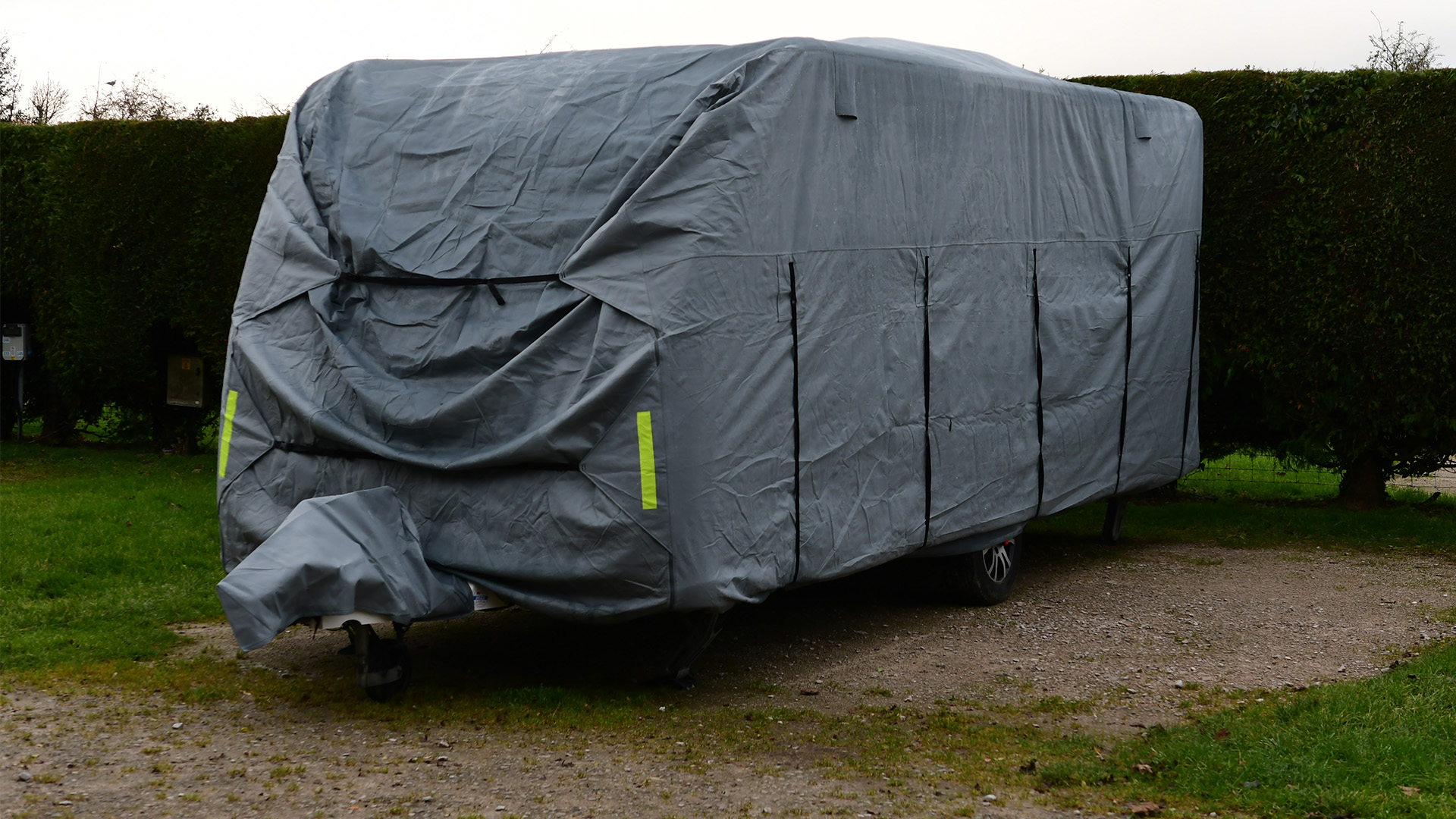
If you are selling a caravan or motorhome
Never part with your caravan until the money has cleared, this includes building society cheques and bank drafts, which can be forged or stolen.
If you are buying a caravan or motorhome
Don't buy caravans or motorhomes in pub car parks or motorway service stations. Check a seller's ID and remember rogue sellers have been known to use the drive of an empty house. Check the caravan's window CRiS ID. Has it been removed or altered? If it so, contact the police.
Check if a caravan or motorhome is stolen
Does it have outstanding finance against it or is an insurance write-off? Contact CRiS (caravans) or HPI (motorhomes) using the CRiS ID or registration plate number respectively.
Be wary of really good deals
When looking to purchase and using the Internet do check the company selling caravans or motorhomes is bonafide. If the price seems too good to be true it probably is so be very cautious. Always pay with a credit card as this should give you additional protection.
If your unit is stolen
- Notify the police and your insurance company. The police will need as full a description as you can give including your unit's chassis number or CRiS number, any other serial numbers and identifying marks or features
- If you have completed the form below, this will be a useful record for the police
- In the case of caravan theft inform CRiS and the Police
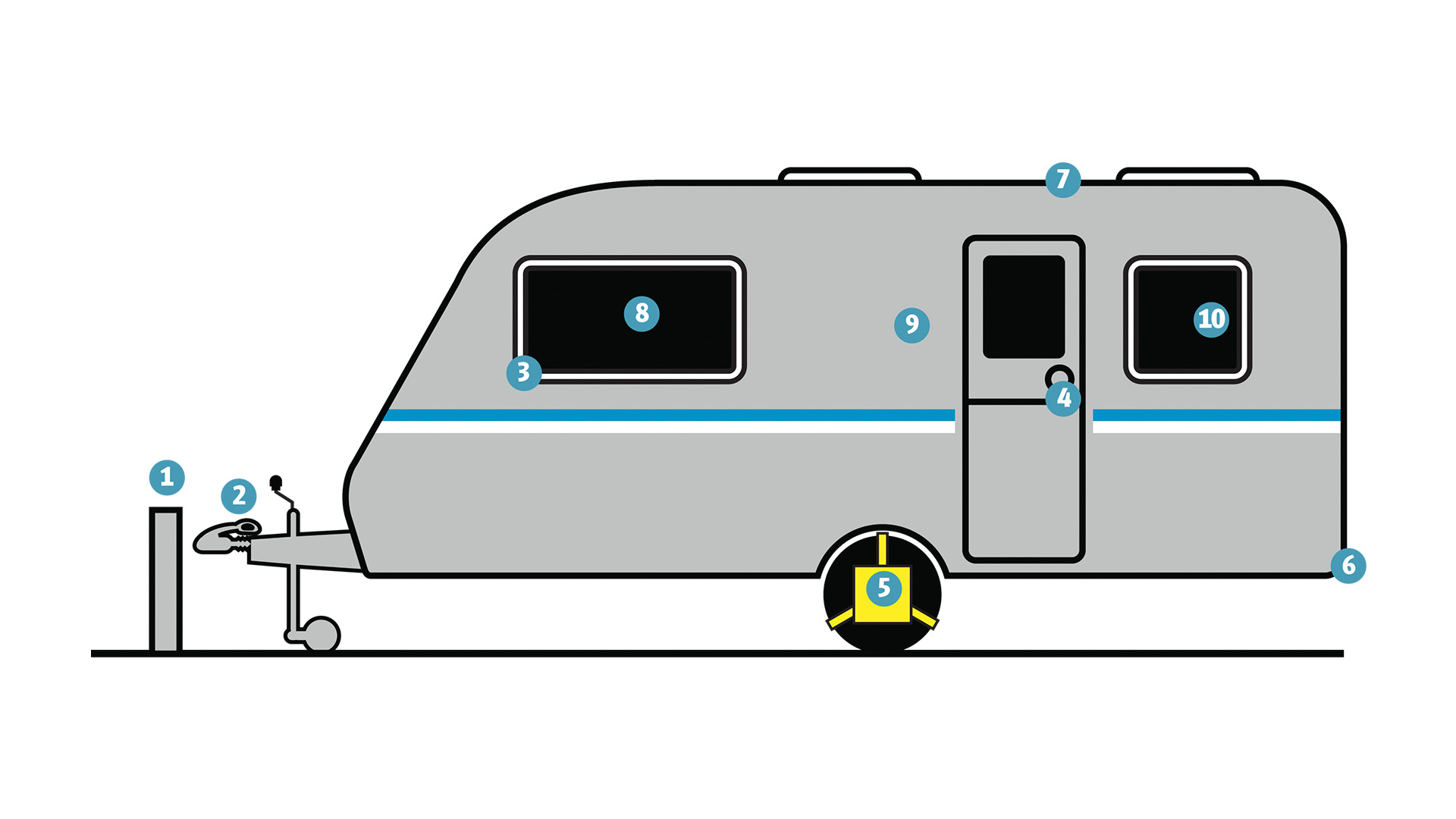
- Security post
- Hitch lock
- Number etched on windows
- High security caravan door lock
- Brightly coloured wheel clamp
- Lock down corner steadies
- Postcode marked on roof
- Items inside marked with postcode
- Reliable alarm system
- Record serial numbers and descriptions of interior fittings
What to consider when storing your caravan
Leisure units are at greatest danger of being stolen when being stored. If you keep your unit at your house you will need to consider many of the preceding products to protect your unit.
An alternative is to use a storage compound. The Club has a number of storage spaces at various Club Sites, click here for further details. If this is not convenient, try the Caravan Storage Site Owners Association (CaSSOA), which has members across the country. Some CaSSOA sites have sophisticated security systems, even indoor storage facilities and are graded Gold, Silver or Bronze according to the level of security available. Other storage sites are available with more basic levels of security.
When in storage it is worth removing personal items from your unit and leave the cupboards open so potential thieves can see there's nothing of value inside. If possible take out the unit cushions. This will not only keep them dry but dramatically reduce the saleability of the caravan.
And finally...
If you hear or see anything concerning caravan theft or disposal of stolen units contact the confidential free phone Crimestoppers Line on 0800 555111. You may be entitled to a reward and there is no need to give your name if you don't want to.
Please note inclusion on these pages does not constitute endorsement by The Camping and Caravanning Club.
